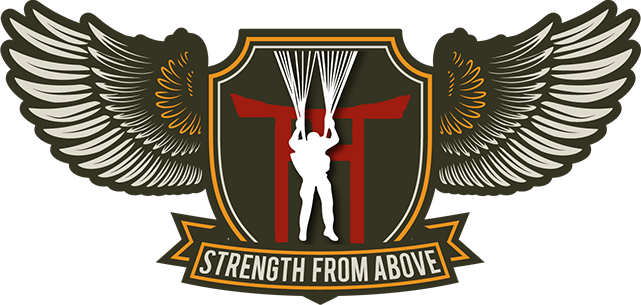Sgt. Hyatt, Donald J.
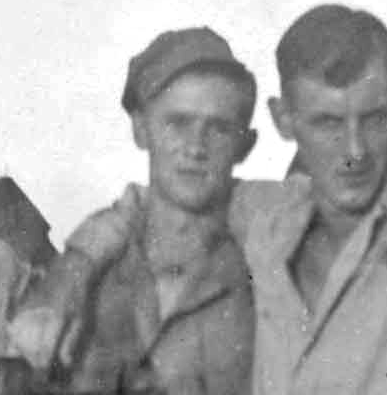
Machine Gunner, Company D, 511th PIR
October 18, 1922 - June 16, 2005 (Age 82) - gravesite
Citations: Bronze Star, Purple Heart, Presidential Unit Citation, World War II Victory Medal, Philippine Presidential Unit Citation Badge, Philippine Liberation Medal with service star, the American Defense Medal, and the Asiatic-Pacific Campaign Medal with three Battle Stars and one Arrowhead
Unit Nickname: "D.J."
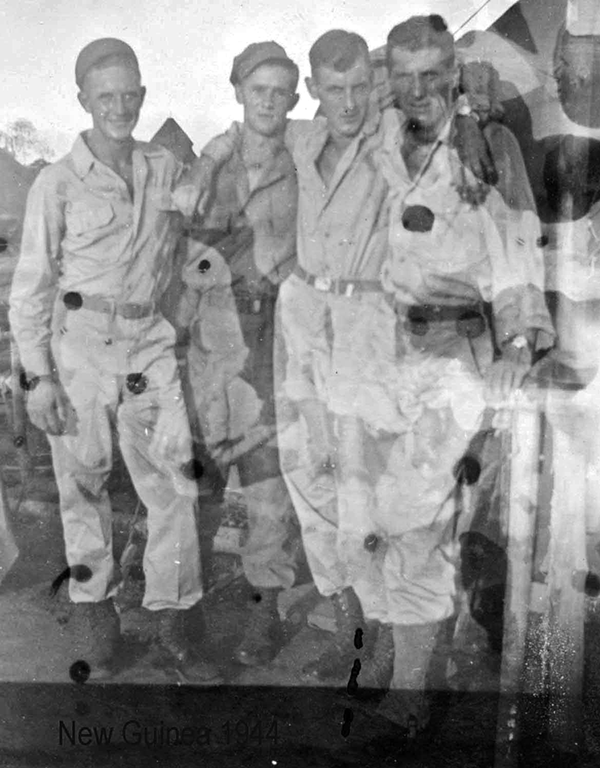 Donald John Hyatt was born in Loup County, Nebraska, the ninth child of John Henry and Mable Austin Hyatt on 18 October 1922. The first twelve years of his life were spent in the ranch lands of the Sand Hills of Nebraska, where he attended the one-room Knobby Ridge School and spent most of those formative years working the land, either in the saddle or behind a team.
Donald John Hyatt was born in Loup County, Nebraska, the ninth child of John Henry and Mable Austin Hyatt on 18 October 1922. The first twelve years of his life were spent in the ranch lands of the Sand Hills of Nebraska, where he attended the one-room Knobby Ridge School and spent most of those formative years working the land, either in the saddle or behind a team.
Following the family’s relocation to Minnesota, Don graduated from Pequot Lakes High School and soon after enlisted for World War II with the U. S. Army Airborne in 1943. He volunteered and trained for the elite and new 511th Parachute Infantry Regiment. As a soldier assigned to Company D of the 11th Airborne, he and his unit were deployed in the Pacific theater and engaged in the arduous battles in New Guinea, the Philippines and Japan. He and the 11th Airborne Division were the first American troops to land in Japan and clear the way for the landing of McArthur and the Japanese surrender. Upon his discharge in December, 1945, he was awarded numerous medals, including the Bronze Star and Purple Heart.
Photo at right: L-to-R: Pvt. C.J. Ross, Pfc. D.J. Hyatt, Cpl. William R. Walter, "Jim"; the Pinochle Players on New Guinea, 1944
After Don’s death in June 2005, one of his best buddies, Billy Pettit, wrote a beautiful Memorial:
"It was with deep sorrow that we of Company D, 511th Parachute Infantry Regiment, learned of Don, D.J’s passing.
"Having literally soldiered side by side with D.J. in those memorable years of 1943 – 1945, I knew D. J. as an individual as well as one who served his country willingly and with great zeal and pride. D. J. volunteered to become a member of an elite new fighting force, the Parachute Infantry Regiment. D. J. was first sent to Camp Toccoa, Georgia and assigned to Company D of that unit along with 160 other young men in their late teens and early twenties. I had the pleasure of starting military life with D.J. and found him to be a devoted friend as well as an excellent soldier.
"The next few months were most trying in that our days were long and the training rigorous. Regardless of the difficulty of the day, D.J. could always smile and offer a wisecrack. Although many of the original group decided to forego the demands of this elite unit, D. J. never faltered and continually looked forward to the day he could wear a pair of prized jump books and pin parachutist wings on his chest.
"It was the responsibility of each student at the Parachute School in Ft. Benning, Ga to pack his own parachute for each of the five qualifying jumps needed for those wings. This was a daunting challenge for D.J. as well as the rest of the unit. We must have done our jobs well, as we had no casualties.
"Following completion of training, the unit embarked for an unknown destination, which later proved to be New Guinea. The ship was crowded and meals consisted of breakfast and dinner with one piece of fruit for lunch. My memory fails me when I try to remember how D. J. fared on the trip. But, if was like most, he must have fed the fish his meals on a frequent basis.
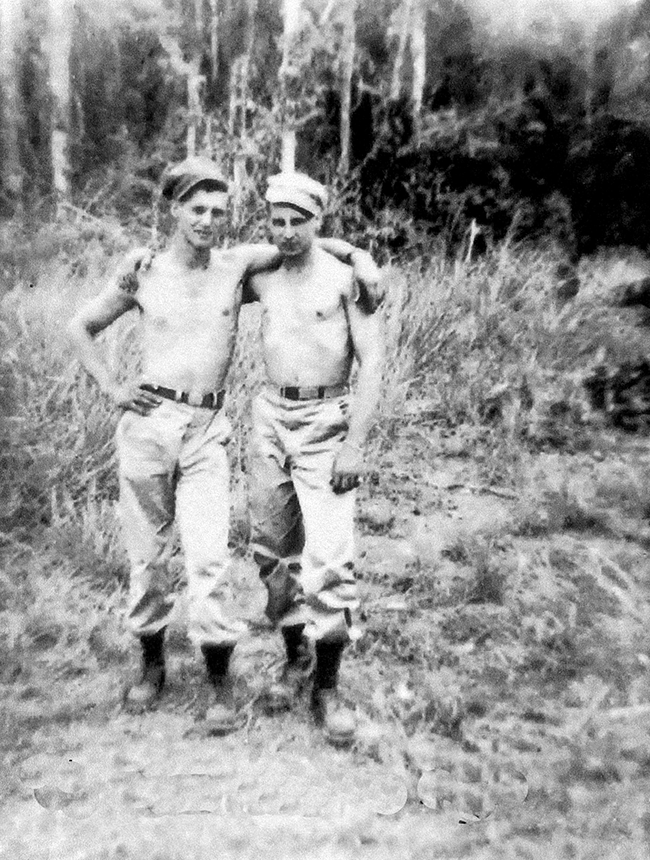 "New Guinea was hot, sticky and sometimes grimy due to the eruption of a local volcano. Food proved to leave a great deal to be desired as fresh mean and vegetables were not part of our daily fare. Everything was canned.
"New Guinea was hot, sticky and sometimes grimy due to the eruption of a local volcano. Food proved to leave a great deal to be desired as fresh mean and vegetables were not part of our daily fare. Everything was canned.
Photo at right: Pfc. Donald J. Hyatt (L) and Pfc. Chauncey S. Poole on New Guinea, 1944. Photo by Pfc. Norman "Red" Zadoorian
"Another boat ride took D. J. and his unit to the Island of Leyte, one of the 2,780 Philippine Islands. A few days later, the Company, along with D. J.’s machine gun team, entered the jungle for a thirty day assault on Japanese forces. Arduous climbs over mountain trails and the abominable weather combined to be a nightmare for the company. Supplies that were available only by air, rain and cloudy skies prevented airdrops and left us without food and supplies. On one occasion hunger became a problem, but relief came after a four day fast.
"D. J. had not yet completed his service to his country. In late January, 1944, his unit was ordered to another island where they landed into aircraft to parachute on the Island of Luzon about thirty miles south of Manila. The drop zone was Tagaytay Ridge. The mission was to form a barrier between the beach assault of the 11th Airborne Division and the Japanese forces. The trek to Manila was bloody. The unit was constantly in contact with the Japanese but was successful in completing its mission. On one of the last missions of D. J.’s unit, he was wounded in action for which he was awarded a Purple Heart. Following cessation of hostilities, D. J. and his unit departed for Japan. He and his 11th Airborne Division were the first American troops to land in Japan. His unit was assigned occupation duties on the northernmost part of Honshu.
"D. J. returned to the United States a few months later, and was honorably discharged and awarded the medals he earned. Among these several awards were the Bronze Star Medal, Combat Infantry Badge, Good Conduct Medal and the Asiatic-Pacific Campaign Medal with three battle stars representing the New Guinea, Leyte and Luzon campaigns.
"I know little of D. J.’s activities after the war other than during our conversations at Company D reunions he often spoke of the many hours he spent in the cab of a crane on bridge and dam construction projects.”
In 1950, Don married Eileen Fogel. They had three children, Jacolyne, Gregory, and Kathryn. Don also shared a special relationship with each of his treasured eight grandchildren and two great-grandchildren.
During the growing years of his family, Don and Eileen made homes in Pickstown and Pierre, South Dakota, and finally moved to Montrose, Colorado in 1963. Don’s chosen career as a crane operator spanned five decades during which he played a strong role in the construction of numerous earth-fill and hydro-electric dams, including the Fort Randall, the Oahe, and Big Bend Dams in South Dakota, and the Blue Mesa, Morrow Point, Crystal, Silverjack and Ridgeway Dams in southwestern Colorado. In 2002, Don received the rarely achieved recognition for 50 years of service and dedication as a working member of the International Union of Operating Engineers. At this point in time, it appears that Don may be the only individual who worked construction to completion on all five dams of the Currecanti Project in Southern Colorado.
Throughout his lifetime, Don lived with a true clarity of purpose and he enhanced and inspired the lives of all the people around him. Don was a member of Zion Lutheran Church, where he share his many skills and talents with a generosity known by all. He was also a member of the Elks Lodge in Montrose, Colorado.
Above by Eileen Hyatt
Typed by Jane Carrico
To WINDS ALOFT May 2010
*Known for his wise-cracking ways, Don kept his sense of humor sharp up until his death on June 16, 2005. At his funeral it was said, “The paratroopers who fought with Don in the Philippines and New Guinea and Japan knew they could count on Don.”
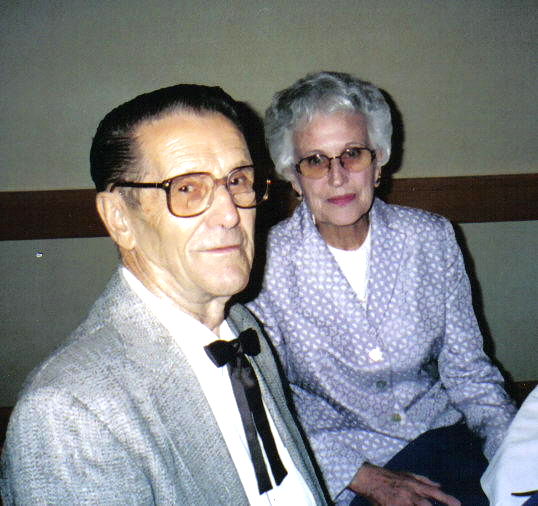 |
|
| Donald Hyatt and his wife Eileen at Division Reunion (photo by Jane Carrico) |
|
If you would like to learn more about Donald's exploits within and the history of the 511th Parachute Infantry Regiment in World War II, please consider purchasing a copy of the book WHEN ANGEL'S FALL: FROM TOCCOA TO TOKYO, THE 511TH PARACHUTE INFANTRY REGIMENT IN WORLD WAR II, available in the regimental online store, on Amazon or wherever military history books are sold.
